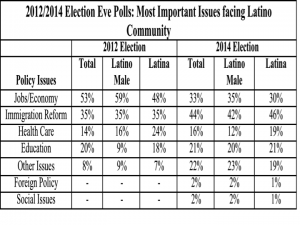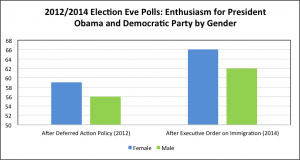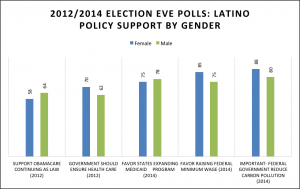We continue to witness the very emotional and controversial debates over several key issues, including ‘women’s issues’ and immigration policy. This is especially evident at the wake of President Obama’s announcement of executive action on immigration. As we look to the key issues that will motivate Latinos to participate in politics, it is important to understand differences across gender.
We cannot assume that all Latinos will share a common attitude on the significant political issues of the day. What issues will persuade Latinos to provide the crucial electoral support to either political party or political candidate? I am interested in answering these questions in terms of variation among Latinos based on gender. How do Latino male and female attitudes differ? It is especially imperative that political officials and political parties understand how their policy and electoral strategies influence the Latino community.
In the United States since the 1980s, women generally hold more liberal policy positions than men. In terms of specific policy views, women are often more supportive of a more activist role for government, more supportive of affirmative action and efforts to achieve racial equality, and more supportive of programs to guarantee quality health care and meet basic human needs (CAWP 1997). Based on this gender trend, we would expect Latinas to also demonstrate a modern gender gap, with more liberal political views than their male counterparts. However, previous researchers have generally found few gender differences for racial/ethnic minority preferences. This includes few gender differences on the most politically salient issues for particular racial/ethnic or gender groups. Instead, the greatest influence on Latino public opinion is generally whether they were born in the United States or the amount of time they have lived in the country (Sanchez 2006). Latinos who have been in the U.S. for shorter amounts of time are generally more likely to support public policies that will help allocate funding to those in need. More recent research finds that there are small gender differences on Latino views on gender issues, with Latinas expressing more support for policies that will help promote gender equality in the U.S.
In the two most recent elections, 2012 and 2014, Latinos identified the most important issues facing the Latino community as the economy, immigration reform, education, and healthcare (Election Eve Polls). The set of policy issues do not change dramatically across both elections, except for the top issue changing from the economy in 2012 to immigration reform in 2014. The gender differences are also minor, with slightly more Latinas reporting that health care and education are important to the Latino community, compared to Latino males who were more likely to choose immigration reform.

In my book, The Latino Gender Gap in U.S. Politics, I found Latinos generally support more liberal policy views, with Latinas generally more liberal than Latino men. The policy areas include gender related issues, reach of government policies (government income support, support the Affordable Care Act continuing as law) and Immigration-Related policies (such as disapproval of workplace raids). A key set of government policies relate to the debate over immigration reform. This set of policies address the support for President Obama given his potential to impact immigration policy. In June 2012, President Obama introduced a deferred action policy for undocumented youth. Latinos generally reported feeling more enthusiastic (53 percent) about Obama after his deferred action policy announcement rather than less enthusiastic (9 percent) (2012 Election Eve Poll). While, 33 percent of Latinos responded that their enthusiasm for Obama was not affected after his June 2012 announcement. There was also a gender gap in the responses, with Latinas showing more enthusiasm for Obama after his announcement compared to Latino males.
More recently, Latinos were asked about their potential enthusiasm for the Democratic Party if President Obama was able to issue an executive order on immigration in 2014. Incidentally, Latinos were asked this question on the eve of the 2014 midterm election, which was actually a couple of weeks before President Obama’s historic announcement of executive action on immigration. Again, Latinos report feeling more enthusiastic (58%) about the Democratic Party if President Obama were to issue an executive order on immigration in 2014 (2014 Election Eve Poll). In terms of gender, more Latinas report they will feel enthusiasm for the Democratic Party after the executive order, compared to the Latino males.

The battle over health-care is also particularly salient for Latinos, given their higher likelihood of being uninsured (29.1 percent in 2012) compared to the general population (15.4 percent) (U.S. Census 2013). The first policy is a measure of Latino support for President Obama’s Affordable Care Act (2012 Election Eve Poll). A majority of Latinos, 66 percent, support allowing Obama’s Affordable Care Act to continue to stand as law. In addition, the majority of Latinos (66%) believe that when it comes to access to health care, the federal government should play a role to ensure that all people have access to health insurance. More recently, the majority of Latinos also believe their respective states (TX, FL, GA, KS, and NC) should accept federal money to expand the Medicaid program so that more low-income people have access to health insurance (2014 Election Eve Poll). In terms of gender, more Latinas (70%) than Latino males (62%) agree the government should ensure access to health insurance. While more Latino males than Latinas support the Affordable Care Act continuing as law and expanding the Medicaid program.

The majority of Latinos also generally support several other key policies that include a greater reach of government. The majority of Latinos, 78%, favor raising the federal minimum wage from 7.25 to 10.10 an hour. In terms of the environment, 84% of Latinos also believe it is important that the federal government take measures to reduce carbon pollution that is causing global warming or climate change. Across these two issues, Latinas also report higher levels of support than Latino males.
Overall, the results can be linked to Latinos’ depth of support for more liberal public policies, which was especially true for Latinas. In fact, the polling of Latinos throughout the 2012 and 2014 elections, demonstrated there is a significant gender gap in support of the more liberal public policies. In terms of which party to trust on ‘women’s issues’, Latinas also had an overwhelming support for the Democrats over the Republicans in 2012, 78% compared to 13% (Manzano 2012). As a result of Latinas’ increased support of more liberal public policies, they may also be more likely than Latino males to support the Democratic Party and their candidates. It is imperative that the political parties devise new strategies to appeal to the very diverse Latino electorate. They should also be determined to focus on Latinas as a key group of Latino voters. This post builds on a series of blogs I have written focused on Latinas, including a recent discussion of the partisan gap among Latinos based on gender.
Christina Bejarano is an Associate Professor of Political Science at the University of Kansas. Her book entitled The Latino Gender Gap in U.S. Politics (2014) was published by Routledge Press.


